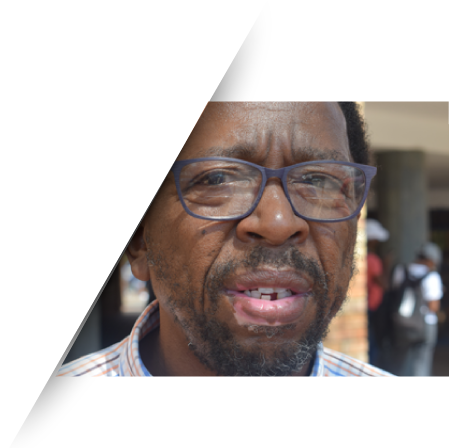
![]() SCROLL
SCROLL
A chance to stabilise power supply
Olebogeng believes that the two coal-fired power plants currently under construction will help South Africa stabilise the power supply, along with solar and other sources of renewable energy.
“In South Africa we can take advantage of solar energy to increase our energy supply,” he says.
He adds that many households and farmers – for instance in the Northern Cape – are already using solar energy. There are also RDP houses using solar geysers.
In addition, mining companies are generating their own electricity from renewable sources for their production, and other institutions, including universities, are doing the same.
NWU economics scholar at the campus in Mahikeng, Prof Olebogeng David Daw, understands the public’s frustration. “In order to foster and sustain economic growth in the country, we need a reliable energy supply,” says Olebogeng.
He is passionate about his field of specialisation in resource and development economics, which covers areas of power system economics and economic planning – a field of great significance to South Africans amid the ongoing power supply crisis.
Olebogeng joined the former University of North-West in 1990 as a full-time student but opted to study part time while working in the university’s finance department to provide for his family.
His early days
Olebogeng, who is currently finalising his first book offering, was born and bred in Kimberley in the Northern Cape. The third of five children, he and his siblings were raised by their mother.
“After completing my first degree as a part-time student, I obtained a scholarship to do an MSc Economic Planning degree at Wits University. I returned to Mahikeng in 1999 as a lecturer in the Economics Department, after which I obtained a scholarship to do a PhD degree at China’s South Western University of Finance and Economics,” he recalls.
About his choice of specialisation, Olebogeng says: “I want to develop policies that will relieve unemployment and poverty among South Africans.”
Olebogeng points out that the South African government is moving towards deregulation of the electricity supply industry. The three sectors that will be deregulated are generation, distribution and transmission.
He says the primary objectives for deregulating and restructuring the electricity supply industry are to:
- Increase fiscal revenue and reduce state debt (a critical factor given Eskom’s R400 billion debt burden)
- Make power generation more efficient and cost-effective by investing in new capacity and technologies
- Promote opportunities for black economic empowerment
- Improve customer service and introduce a choice of power suppliers
This, he says, can only be possible after the deregulation process.
Prof Olebogeng Daw is married and the couple has five children. He enjoys socialising with friends, participating in community forums, playing table tennis and listening to a steady stream of reggae and gospel music.


Reliable energy supply critical to SA’s fortunes
The reality of load shedding and the challenges that go with it are another knock to the already struggling South African economy. Still, there may be some light at the end of the tunnel if the country succeeds in reforming the energy sector.
![]() SCROLL
SCROLL
![]() BACK
BACK
